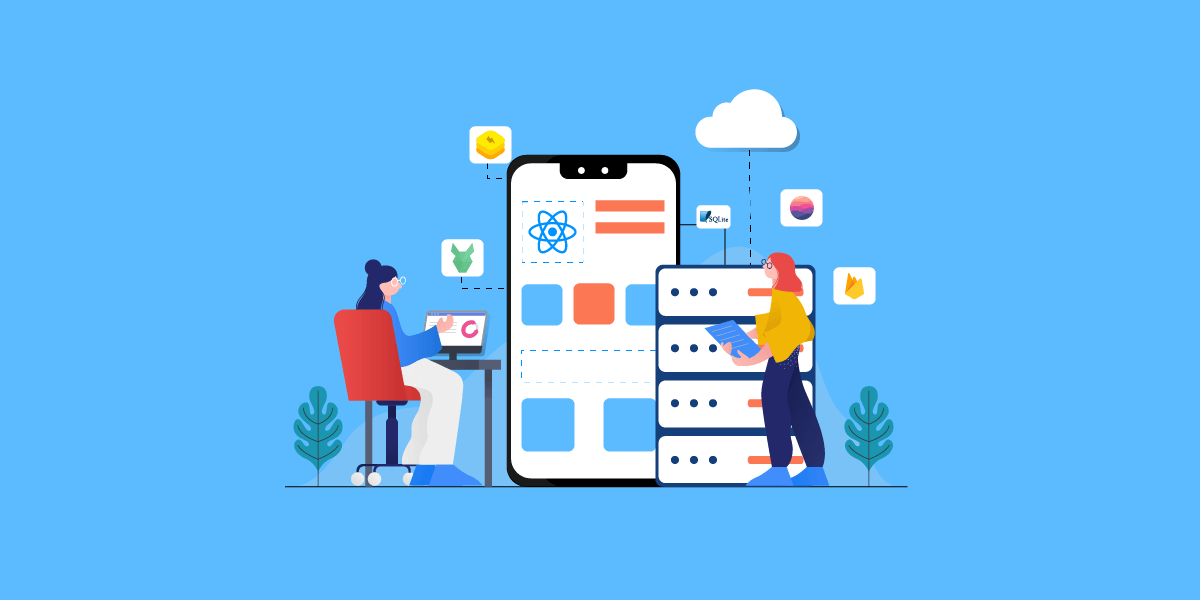- Factors to Consider When Choosing React Native Databases for Your Project
- Complexity of the Data
- Number of Line of Codes
- Synching of the Offline Data
- Handling Data Conflicts and Concurrency
- Memory Management
- Which Are The Best Databases For React?
- Realm
- Firebase
- SQLite
- PouchDB
- Async Storage
- Watermelon DB
- Vasern
- BerkeleyDB
- Back4app
- DigitalOcean
- AWS RDS
- Conclusion
- FAQs About the Top React Native Database
React Native has established itself as a prime choice of startups and establishments looking for a mode to enter the app domain in a cost and time-efficient manner. And with this establishment, the focus has once again shifted on the incorporation of the platform in the app development process, especially when entrepreneurs are looking to build cross-platform applications.
Increasing with this full-grown demand for React Native app development is the pressure on React Native developers to develop high-performing offline first apps that can be scaled whenever required.
This, in turn, has led them to look back at the technology stack and choice of platform to build React Native applications off of. Especially the backbone of the application – React database.
In this article, we are going to look into names that are fit for React Native app development today and are worthy of being in the list of top React Native databases for 2021 and beyond.
Let us start in a full disclosure mode, though.
Let’s highlight the factors we looked into when curating the list of the top react native databases and for some more years to come.
Factors to Consider When Choosing React Native Databases for Your Project
Complexity of the Data
A key-value react native storage is default option for a number of server-side and client-side scripting languages. Mainly, both – values and keys – have to be serialized in strings, either by a React Native developer or through the library itself. Now although necessary, serialization can bring serious halts and issues in how your application performs, especially when it operates in a limited resources environment of smartphones.
So, ideally a react native development company chooses a database which helps you store more complex data compared to the key-value pairs like full documents and objects and comes with complex data types.
Number of Line of Codes
If you take more than 20 lines of code to write a simple CRUD operations, any advanced database should be your last choice. Because, not only an advanced DB would make coding complicated but it would even affect the database performance heavily and the overall React Native app development cost. Additionally, processing of so many code lines would slow down the application greatly.
So do not make use of a database that comes with advanced functionality if it carries the chances to lower your app’s user experience and delay the release speed.
Synching of the Offline Data
If you are developing a low complexity application which does not offer multiple-user collaboration, you can use a simple database that would work well with a simplified synchronization functionality. These app types can sync with the server whenever an internet connection is established.
With collaboration being the primal feature of an application, syncing functionality demands the database to be complex. Applications like Trello, which cannot show different versions of a document or project, however, requires a react native mobile app development company in USA to achieve perfect synching even when the network conditions are patchy.
Handling Data Conflicts and Concurrency
The more collaboration related features you add inside your application, the more would be the possibility of data conflicts.
You should look for databases, which share the conflict-handling policies on websites or the repository pages. Dig into the database documents to get aware of how they handle syncing and conflicts or look into the trade-offs that are made and the effect it would make on the application.
Memory Management
Inefficient database memory handling practices can lead to app crashes.
Compaction is one of the proactive processes of memory management in which the documents or data that are not going to be of use are deleted from the memory.
The process is like the ‘garbage collection’ part of programming, which ensures there is free memory available at any given point in time.
On the basis of these five factors we have identified the local database for react app options which would be best suited for your react native application development process.
Which Are The Best Databases For React?
Realm

The Realm database for react native has been brought into existence for development of real-time and offline applications which run on both wearable and mobile devices. The database has proved to be equally beneficial when you create React Native mobile apps for iOS and Android. It is not built on ORM or on top of SQLite, so it comes with own database engine and does not rely on the key value stores.
This is one of the reasons why React native app developers use Realm as one of the chosen local react native database connection options to handle large data or for the development of high performance applications.
While there are other databases for simple apps, the combination of Realm database for React native is best suited for large sized apps.
Benefits of Realm In React Native:
- Realm Sync – the sync services operate in the background and records, saves all the user interactions and the service requests locally.
- Offline friendliness through Redux Offline – for those looking for a solution to implement offline-first architecture through Realm for React native apps, Redux offline can be a great option.
- Security – It uses multiple encryption standard for every different mobile platform.
Pricing:
The Realm is a local react database app that is completely open-source and free. The pro version, though comes with a cost. But if you purchase the platform for creating react native apps it would cost $1750 per month.
Firebase

Firebase supports the real-time NoSQL database for the development of react native applications. It is chosen mainly for its offline data change and data synchronization practices. The reason why Firebase for Startups is such an in thing is because it is completely capable of handling the requirements of the M and C of the MVC needed for react native based applications.
Benefits of Firebase for React Native App Development
- Real-time syncing of data – with Firebase for React Native, the data is synced in real time for all clients, at the same time. This becomes very important for when an app goes offline unannounced because of the unavailability of internet connection.
- Low setup efforts – Firebase offers a cross-platform API which calls for minimal setup when it is being used inside an application. Additionally, you won’t need an application server for accessing the data as it can directly be accessed through a mobile phone.
- Offline persistence – the combination of Firebase and React Native gives the developers an ability to develop real-time apps with offline persistence capabilities. This consists of marking users’ presence online or offline and storing timestamp whenever users get disconnected.
Pricing:
Firebase is free react native storage that provides upto 1GB data storage. However, it does offer a $25 for 2.5 GB data storage minimal price in addition to a pay as you use package.
SQLite

It was designed to offer react native local storage database to mobile applications. The prominence of the word Lite in the database name implies that it is a lightweight library and that it requires minimal setup. It can also be directly integrated within the mobile application for directly accessing the database.
Benefits of SQLite for React Native based Application Development
- ACID compliance – it is an ACID compliant database which implements SQL standards with some omissions. The architecture of the library is file-based and there are some tools that can handle all the data types with simplicity and ease.
- Offline persistence – In order to enable the offline persistence via SQLite, developers can use a react-native-SQLite-storage plugin for managing data within application.
Pricing:
SQLite, being in the public domain is free to use and open source. However, if you want to obtain license for copyright infringement, you would have to pay one time fees of $6000.
PouchDB

PouchDB is an open source Javascript database that stores data in JSON format and enables developers to take advantage of using React Native in the easiest manner: by developing, reading, updating, querying, and deleting queries with a single JavaScript API. The database is compatible with MySQL, CouchDB, PostgreSQL, and MongoDB.
Benefits of PouchDB for React Native App Development
- Because the PouchDB stays inside a browser, the need to perform queries over network is not there. This, as a whole, leads to faster queries’ execution.
- React native mobile app developers can sync data with any supported server and thus can run the applications both offline and online.
Async Storage
Async storage is a react native local storage database system that gives developers the capability to store data locally and persist data between the app reboots. The database comes in-built with React native so it can be used without any additional deployment.
Benefit of Async Storage for React Native Apps:
- It comes in handy when you have to save the data which the app need to use even after the user has closed the app or the device.
Watermelon DB

Built on SQLite, it is a high-performance reactive database for React Native app which comes with the potential of scaling hundreds to thousands of records without losing its speed. The database has been well optimized for building complex applications in React Native with a focus on real-world performance.
Benefits of Watermelon DB for React Native App Development:
In addition to scaling over 100 – 10000 records, Watermelon DB also supports developers to take full advantage of using react database through:
- Offline first system
- Static typing with Flow
- Building apps on SQLite foundation
Vasern

It is one of the most lightweight, fast, and open-source databases for app development using react native. The Vasern API is used not just for local data or react native storage but also for cloud storage and syncing across the app’s clients. Vasern’s design and structures are inspired by various open source databases.
The Benefits of this Inspiration from Multiple Open Source Database Include:
- It is open source
- Developer friendly end-to-end database syncing
- Focus on consistency and performance
- Fast operation
BerkeleyDB

Berkeley DB is an open source, high performance backend for React Native which allows developers to handle data in multiple ways. It offers an API for multiple languages which includes iOS and Android.
It can handle data in multiple ways: a relational way like how SQLite does or through the Key/Value pair data as byte arrays and supports multiple data items for a single key.
Back4app

It helps developers in making APIs seamless without the requirement for coding. It gives the tools important to create a whole application backend on the cloud with known functions and the consideration of third party services.
It is a server-less database for react native app where you can lead relational inquiries and make relational information models quickly. The platform depends on an assortment of open-source technologies.
Benefits for React Native App Development
- Relational database schema & queries
- Cloud code functions
- Real-time queries
- REST APIs and GraphQL
- Cross-platform SDKs
- Interface like spreadsheet
DigitalOcean

DigitalOcean Managed Databases are high performing and totally managed data set cluster service, including end-to-end SSL encryption, backup nodes for accessibility, and PITR (point in time) recuperation. It is an amazing replacement for installing, setting-up, securing, and dealing data sets by hand.
Benefits of Digital Ocean for React Native App Development
- Quick setup and maintenance
- Highly scalable and automatic failover
- Free backups and powerful performance
AWS RDS

Amazon Relational Database Service (AWS RDS) is a high performance database for react native that permits you to smoothly set up, scale, and work a relational database over the cloud. With a resizable limit and proficient costing, it automatically handles lengthy cycles like data base arrangement, hardware provisioning, reinforcements, and patches. Its primary advantage is that it allows you to focus on your applications so you can give them the security, high accessibility, compatibility, and performance that they require.
- Easy to operate
- Supports the most robust applications
- Runs on a very reliable infrastructure
- On-demand pricing option
Conclusion
While these are the top React native databases of the current and the speculated time there are a number of other backend tools that developers and react native app development companies use to create their application.
The answer to which is the best database tool ultimately depends on your project type. Get in touch with our consultants to discuss which database for react app would best suit your project.
FAQs About the Top React Native Database
Q. How To Choose The Right Database For Your React Native Application?
The choice of the best react native database is dependent on a number of factors. Some of the most pivotal ones are:
- Complexity of the Data
- Number of codes
- Synching of the offline data
- Memory Management
Q. What is a local database in React Native App?
A local database software is one which is local to your application. It makes use of an SDF data file. In case of React Native, there are multiple databases, some of which are – Realm, Firebase, SQLite, etc.
Q. What is the role of Local Databases for react native app development?
There cannot be a fixed textbook answer to this. It depends entirely on your app type, the complexity you are opting for and the budget you have set.


- In just 2 mins you will get a response
- Your idea is 100% protected by our Non Disclosure Agreement.

React Native Vs Swift - Choosing the Right Mobile App Development Framework for Your Business
Today, a mobile app is essential for companies to connect with their potential customers in a competitive digital atmosphere. The choice of app development framework for building your mobile app is crucial as Android devices command a huge market of more than 70%, with Apple’s iOS following at almost 28.8%, according to Statistics Q3 report…

10 Mistakes to Avoid When Developing React Native Apps
With over 1.6k active contributors working to make React Native a success, the glitter of a bright framework future has not gone unnoticed by developers looking to make a name in the cross-platform world. The demand of app development with react native is getting from the developers is not just the doing of the fact…

How Does React Native 0.61 Fast Refresh Impacts Developers?
Whenever we talk about the cross-platform, mention of React Native has to be made. In the pre-cross-platform era, developers struggled with traditional methods like Native technology, where they had to code separately for each platform it is going to target. For instance, say a developer had to make an app for iOS and Android as…
















